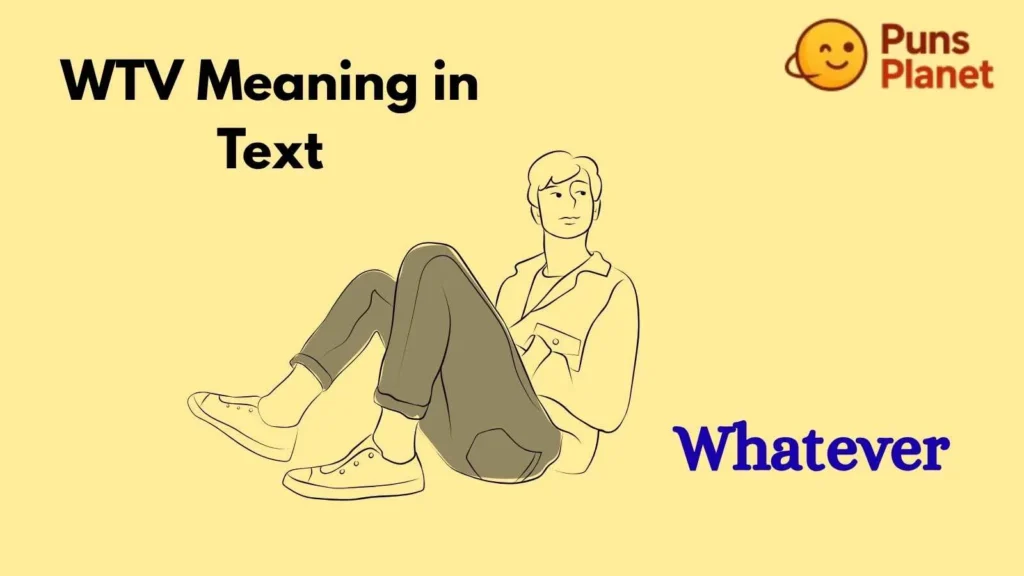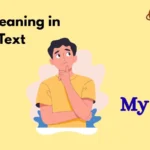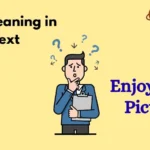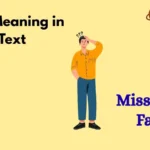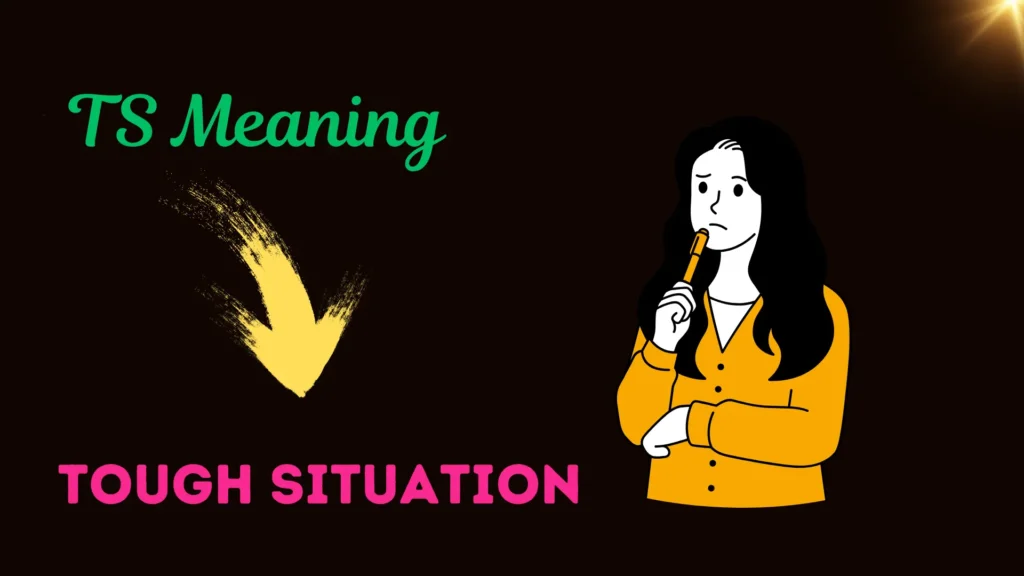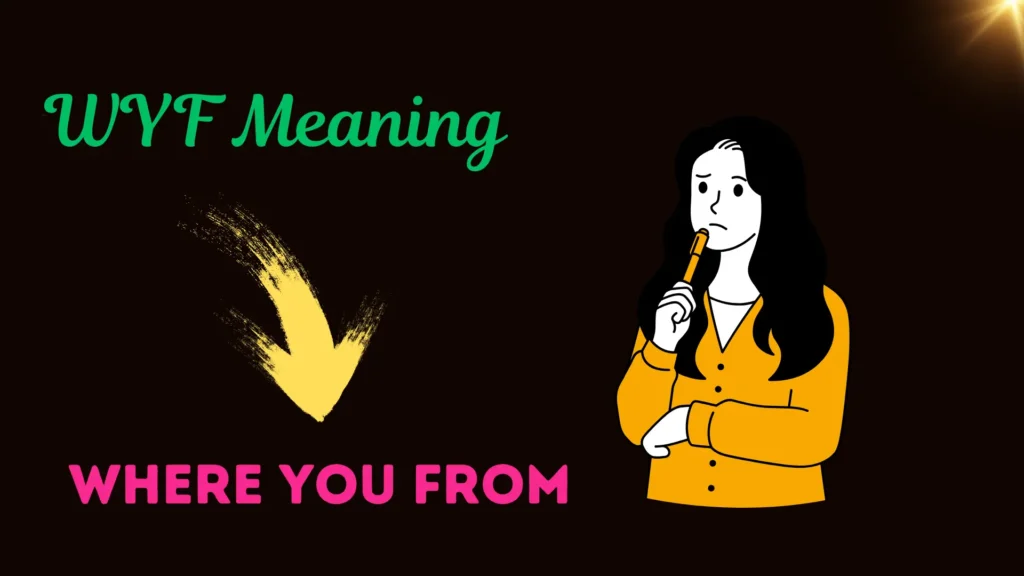WTV meaning in text is one of those abbreviations that pop up in chats and leave people wondering, “What on earth does that mean?” 😅 In the fast-paced world of texting and social media, acronyms like WTV save time and add a casual, conversational vibe. But understanding its meaning and tone is essential — especially when one tiny abbreviation can change the entire feel of a message.
In this guide, we’ll break down the meaning of WTV, its usage in texts, how tone affects interpretation, and examples of how to use it naturally.
Whether you’re scrolling through Snapchat, messaging on Instagram, or chatting on WhatsApp, this article will help you become fluent in digital lingo. 😉
📖 What Does WTV Mean in Text?
The abbreviation WTV stands for “Whatever.” It’s commonly used in casual texting or social media chats to express indifference, flexibility, or mild annoyance. The tone depends heavily on context and punctuation.
- Neutral use: “Wtv, I’m okay with anything.” (meaning: I’m flexible)
- Dismissive use: “Wtv, do what you want.” (meaning: I don’t care)
- Playful use: “Wtv 😂 you’re so dramatic.” (meaning: light-hearted)
So, while WTV technically means “whatever,” it carries emotional layers depending on tone, relationship, and situation. That’s why understanding context is key! 🔑
💬 Common Ways WTV Is Used in Conversations
Let’s look at some realistic texting examples showing how WTV appears in modern digital chats:
| Context | Example Text | Meaning |
|---|---|---|
| Casual chat | “We can eat pizza or burgers, wtv works.” | Indifferent / easygoing |
| Argument | “Fine. Wtv.” | Frustrated / dismissive |
| Flirty message | “Wtv you say, I’m still right 😏” | Playful / teasing |
| Group chat | “Wtv guys, let’s just decide later.” | Neutral / laid-back |
As you can see, tone and context give WTV its true meaning. 🧠
🧩 Variations and Similar Abbreviations to WTV
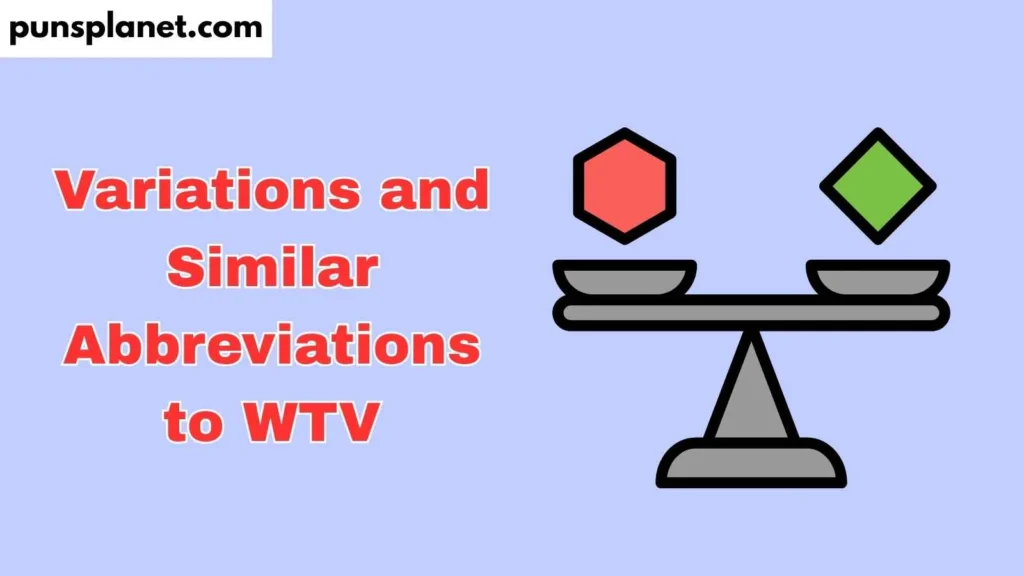
Text slang evolves constantly, and WTV has a few cousins in the same family. Here are some similar abbreviations you might see:
- IDK: “I don’t know” — expresses uncertainty
- IDC: “I don’t care” — shows disinterest or frustration
- TBH: “To be honest” — introduces honesty or openness
- LOL: “Laugh out loud” — lightens the tone
- OMG: “Oh my God” — shows surprise or excitement
These abbreviations often appear together in digital talk. For instance: “IDC, wtv LOL.” 😆
😅 The Emotional Tone Behind WTV
While WTV looks simple, it’s surprisingly rich in emotional expression. Depending on tone, it can sound chill, annoyed, funny, or dismissive.
1. Neutral / Chill Tone
When someone says “wtv,” it often means they’re okay with any outcome.
Example: “We can go out or stay in, wtv.” (No strong preference)
2. Annoyed / Dismissive Tone
When used after a disagreement, “wtv” can signal irritation or withdrawal.
Example: “You never listen. Wtv.” (Frustrated)
3. Playful / Sarcastic Tone
Used with emojis or humor, it can sound teasing or joking.
Example: “Wtv, you just love being right 😜.”
📱 WTV Meaning on Snapchat, Instagram & TikTok
Each social platform has its vibe, and WTV adapts accordingly. Here’s how it’s interpreted across apps:
| Platform | Common Use | Example |
|---|---|---|
| Snapchat | Used in snaps or replies to keep it short | “Wtv lol, I’m too tired for drama.” |
| Used in DMs or captions to sound casual | “Wtv happens, happens 💅” | |
| TikTok | Appears in captions or comments for humor | “POV: You did your best but wtv 😂” |
On all these platforms, WTV is part of the effortless, humorous, and slightly sarcastic tone Gen Z loves. 💫
🧠 How to Reply When Someone Says “WTV”
Your response depends on their mood and message tone. Here are a few examples:
- If they’re chill: “Cool, let’s decide later!”
- If they’re upset: “Hey, are you okay? You seem off.”
- If they’re joking: “Haha, classic you 😜”
Being emotionally aware in digital conversations builds better communication — even with abbreviations like WTV. ❤️
💡 WTV in Different Generations
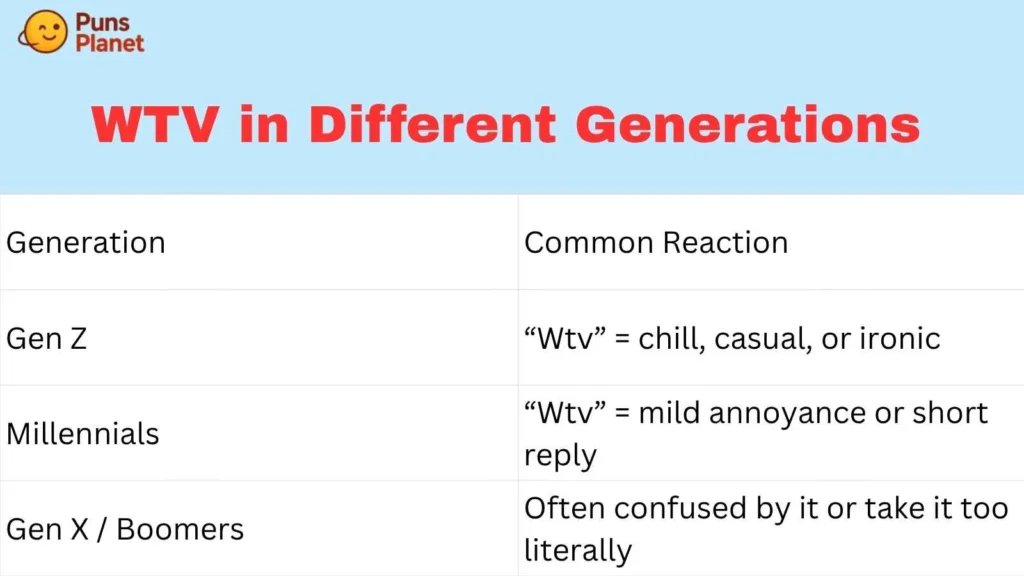
The interpretation of WTV can also vary by generation. Here’s a quick look:
| Generation | Common Reaction |
|---|---|
| Gen Z | “Wtv” = chill, casual, or ironic |
| Millennials | “Wtv” = mild annoyance or short reply |
| Gen X / Boomers | Often confused by it or take it too literally 😅 |
Language evolves — and WTV perfectly captures the minimalist style of modern texting.
🗣 WTV in Spoken Language
Although born in text culture, WTV has also jumped into speech. You might hear someone casually say, “Wtv, I’m fine,” mimicking the same tone as texting. It shows how digital language shapes our real-world conversations. 📞
⚙️ Grammar Note: Is WTV Formal or Informal?
WTV is strictly informal. It’s suitable for friendly texts, online chats, and casual posts — not for professional or academic communication.
- ✅ Correct (casual): “We’ll go tomorrow, wtv works.”
- ❌ Incorrect (formal): “We can schedule the meeting wtv.”
In professional emails, use full expressions like “whatever works best for you” instead.
💬 Common Misunderstandings of WTV
Sometimes, people misread WTV as sarcasm or rudeness when it’s not intended that way. Tone indicators or emojis can help clarify intent. For example:
- “Wtv 😅” = light-hearted
- “Wtv.” = possibly annoyed
- “Wtv 😂” = joking
Adding an emoji often transforms the vibe completely. 🎭
🧾 Origin of WTV
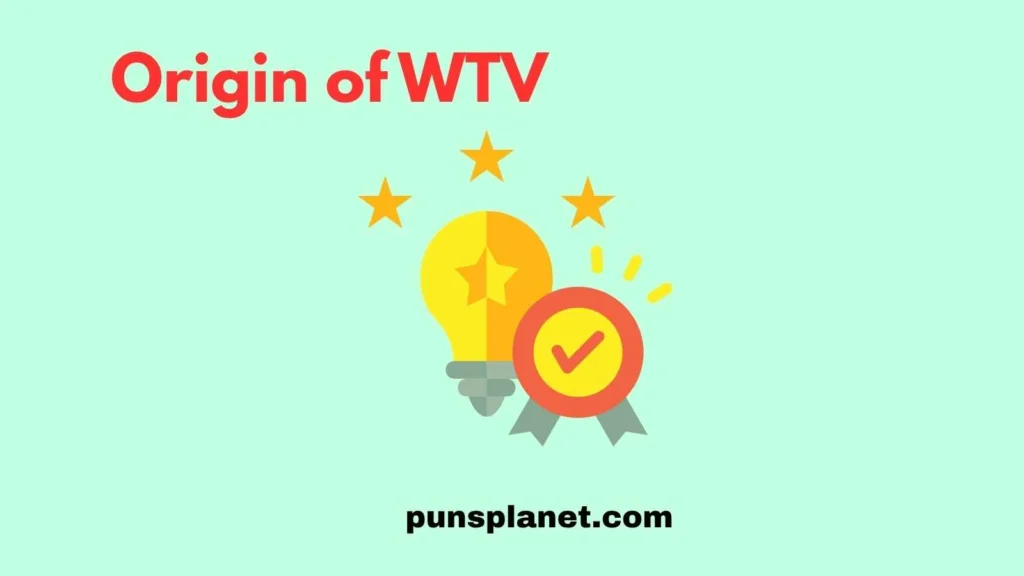
The term “WTV” started appearing in online chats and texting during the early 2000s as part of shorthand internet slang. It evolved alongside other abbreviations like “LOL” and “BRB.” Over time, it became a staple in digital talk, especially among younger users on Snapchat and TikTok.
Today, it’s considered a mainstream abbreviation that most internet users understand intuitively. 🌐
🌟 WTV vs. Whatever – What’s the Difference?
Technically, they mean the same thing — but tone and medium set them apart:
| Form | Usage | Example |
|---|---|---|
| WTV | Informal, used in text/chat | “Wtv, I’m done arguing.” |
| Whatever | Spoken or written, can be sarcastic | “Whatever, I don’t care.” |
So while both convey indifference, WTV feels quicker, shorter, and more modern. ⚡
🧭 When (and When Not) to Use WTV
✅ When to Use WTV
- In casual chats with friends
- In social media captions or comments
- When showing flexibility or humor
🚫 When Not to Use WTV
- In business or professional communication
- With someone unfamiliar with text slang
- During serious conversations (can sound dismissive)
Knowing when to use WTV keeps your communication smooth and clear. 💬
📚 Synonyms & Alternatives to WTV
Depending on your tone, here are some alternatives:
- Whatever works — polite and flexible
- Doesn’t matter — neutral and clear
- Up to you — cooperative
- IDC — more direct and blunt
- Either way — open-minded
Using synonyms helps you maintain the right tone for each situation. 🗝️
🧩 Cultural Influence of WTV
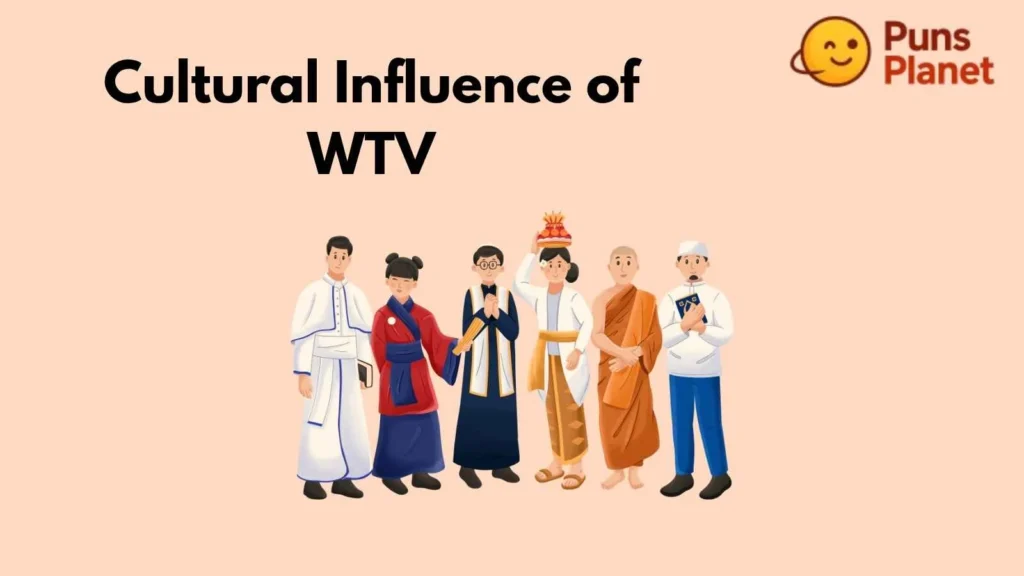
WTV is not just a word — it’s a reflection of how digital culture shapes our communication. In an era of short attention spans and emoji-driven expression, it represents efficiency, emotion, and modern youth language.
Just like memes and gifs, WTV blends humor and detachment, capturing the internet’s unique voice. 🌍
FAQs:
1. Is WTV rude?
Not always. It depends on tone and context. “Wtv 😊” sounds chill, while “Wtv.” can feel dismissive or annoyed.
2. What does WTV mean on Snapchat?
On Snapchat, “WTV” usually means “whatever” — used casually or humorously in chat replies or captions.
3. Is WTV the same as IDC?
No. “WTV” means “whatever,” while “IDC” means “I don’t care.” WTV is milder and more neutral.
4. Can I use WTV in professional communication?
It’s best to avoid it in formal settings. Use “whatever works best” or “I’m flexible” instead.
5. What’s the difference between “whatever” and “wtv”?
Both mean the same, but “wtv” is informal and common in texting, while “whatever” fits spoken or written English.
Conclusion:
In the digital age, WTV has become more than a simple abbreviation — it’s a reflection of how people express emotions quickly and casually online.
Whether you’re chatting with friends or commenting on TikTok, understanding WTV meaning in text helps you interpret tone, avoid misunderstandings, and stay fluent in internet language. 💬✨

